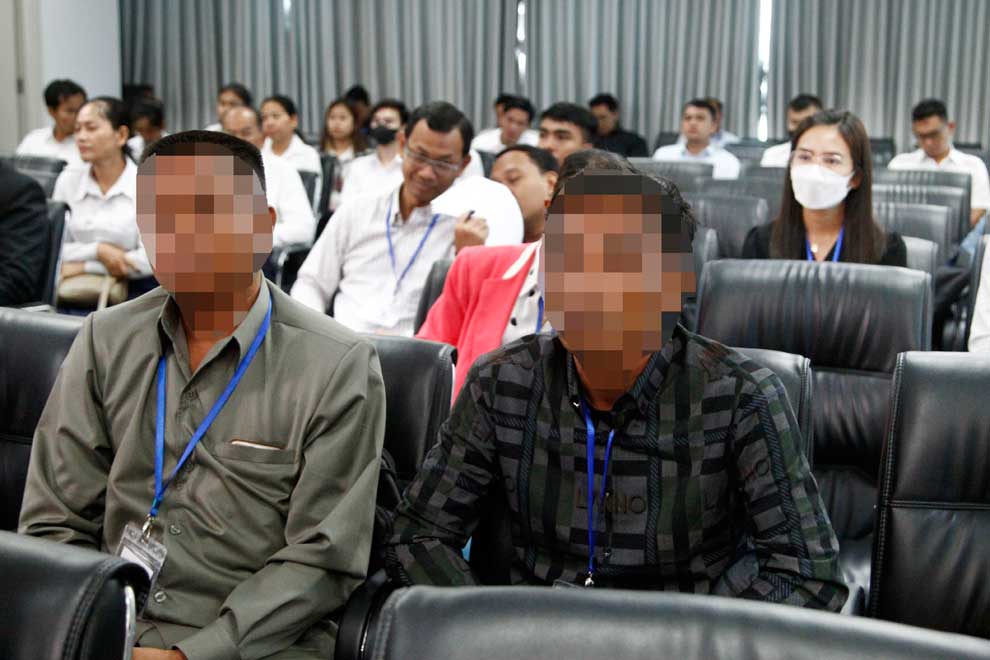
Two of the individuals who were found guilty by the NEC of provoking people to spoil ballot papers, at their July 27 trial. Heng Chivoan
The National Election Committee’s (NEC) trial chamber on July 27 handed down fines ranging from 10 to 15 million riel ($2,500 to $3,750) against four individuals.
In a decision led by NEC chair Prach Chan, the committee also stripped these individuals of their voting rights for encouraging the spoiling of ballot papers.
The judgement was announced following receipt of complaints from the provincial election commissions of Kampong Cham, Pailin and Tbong Khmum against these five individuals.
The reports suggested these individuals had responded to calls to spoil their election papers, a call instigated by former self-exiled opposition leader Sam Rainsy, himself barred from participating in the election process in a prior NEC decision on July 17.
NEC spokesman Hang Puthea briefed the press following the trial. He highlighted the case’s intricacy, explaining that the commune election council and the provincial election council failed to reach a resolution and had to defer the matter to the NEC.
“We stand by the verdict of the provincial election commission. This means the five accused will be required to pay fines ranging between 10 and 15 million riel.
Additionally, they will be struck off the electoral roll and prohibited from running as candidates in any future elections,” Puthea said.
This decisive action against electoral misconduct highlights the severity of the accusations and reaffirms the NEC’s dedication to upholding fair election practices.
Separately on July 26, the Phnom Penh Election Commission imposed a hefty fine and a lengthy ban on 21 individuals, effectively barring them from standing in any election for two decades.
The accused, who have been fined 10 million riel each, were alleged to have incited and instructed voters to spoil their ballots.
Sim Dony, who presides over the Phnom Penh election commission, declared on July 26 that this action was taken on solid evidence, including videos disseminated through social media platforms.
These individuals have not only been fined but have also been delisted from the electoral roll and prohibited from participating in elections for the next 20 years.
“We based this decision on the complaints and proof we received, such as the videos they posted and shared on social media,” Dony said.
On the same day, NEC spokesperson Som Sorida referred to Article 142 of the amended election law as the basis for the action taken.
He explained that this law applies to all individuals, whether they reside within Cambodia or overseas.
According to Article 142, anyone found interfering with the voting process or urging eligible voters to refrain from voting is liable to fines ranging from five to 20 million riel. The NEC has the power to impose additional criminal penalties as well.
“This essentially means they forfeit their right to stand in any election, should they return to Cambodia,” he said.
The complaints leading to these legal actions originated from various provinces, with one from Kampong Cham and two each from Pailin and Tbong Khum, he revealed.
Tumpen Virakvitou, president of the Civil Society Organisation Network (CSON) in Cambodia, opined that the penalties and disenfranchisement meted out to these 21 individuals align with the provisions of the amended election law.
He argued that despite being aware of the law, these individuals committed acts that flout it, setting a poor example by showing disrespect and defiance towards legal mandates. In light of these facts, Virakvitou expressed his support for the Phnom Penh election commission’s decision to penalise and disenfranchise them.
“As someone working in a civil society organisation, I think the NEC had done its job by disseminating the law prior to the election. Both formally and informally, people were made aware of the law. However, they ignored these warnings and still violated the law. Therefore, applying the law to them is the right course of action,” he stressed.








